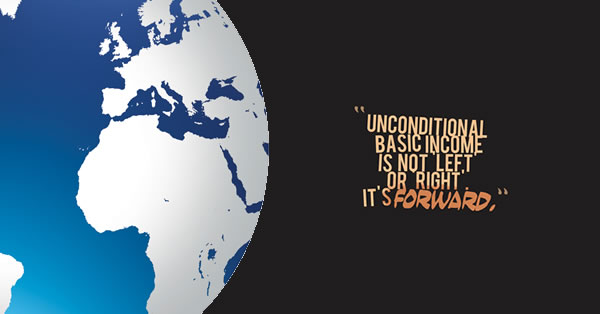The idea for an unconditional basic income (UBI) is not new – it has been around since at least the 1960s. Its time seems to have finally come as the international calls for the UBI continue to mount – and they are coming from those on all sides of the political spectrum.
In developing countries the UBI is old hat – it is readily accepted as an effective tool against poverty. China is the latest of many developing nations to discover that unconditional benefits are far more effective at reducing poverty than targeted ones.
But what is new and surprising is that the UBI is catching on in the Western World – and it has fans on all sides of the political spectrum. The ever-progressive Dutch are piloting the UBI with beneficiaries in the city of Utrecht, while some form of UBI is being looked at in Finland, Greece and even Canada’s most right leaning provinces. In most of these cases it is being touted as a way of dealing with the poor or beneficiaries – so not quite universal – but nevertheless it is a start.
The concern of course is that with a UBI people would stop working. The evidence from experiments so far is that the UBI does not reduce our inclination to work – as long as it isn’t set too high. It is not surprising that the main effect is among young people who use it to extend their education and training.
Why is the UBI facing such a renaissance? It is being touted as the solution to the West’s growing inequality problem – and may be more effective at reducing poverty than continually pushing up the minimum wage. Certainly with increasing mechanisation there is a risk that there simply won’t be enough jobs for everyone – some futurists are predicting 50% unemployment in coming years.
Can we afford it?
The main objections to a UBI – that it is not affordable and that it’s a disincentive to work – are more and more irrelevant. For countries like New Zealand that continue to enjoy rising GDP per capita but have a growing number of working poor (where the market clearing wage is insufficient to live on) clearly it’s more “affordable” every year – it is just a matter of taxing the right things. The problem isn’t getting people to seek paid work, it’s about ensuring they’re paid sufficiently when they get it. Policies like Working for Families are a very strong acknowledgement that they are not.
With the prospect that ongoing automation and outsourcing from the ICT revolution and globalisation will lead to less and less paid work being available in developed countries, despite a rising GDP per capita, the need for income supplementation of the working and non-working poor is set to grow. The UBI is the policy that fills that gap.
For all these reasons it is no longer tenable for serious economic and social commentators to ignore the UBI. As a solution it is a no brainer, which is why the support for the idea is so widespread; the only problem commentators face is how to pay for it. Our current tax system – based as it is on a narrow view of cash income – is poorly equipped to raise the necessary money.
That is where the Morgan Foundation’s work has made a unique contribution to the international debate. Our 2011 book “The Big Kahuna” showed the policy is affordable in a fiscally neutral way if New Zealand governments are prepared to move on closing the loopholes in the tax system. The biggest loophole by far is the taxation of income that owners of capital (land, structures, equipment, intellectual property) enjoy and are not taxed on, while the second most significant tax loophole is the dodging of tax by foreign owned companies.
Unfortunately recent New Zealand governments have shown no inclination whatsoever to act on either. The result has been a growing disparity of income and wealth across the population and this bifurcation of the economic well-being of the population has all manner of knock-on effects in the social arena.
The extent of the taxation reform we’re talking about is not trivial and it’s the magnitude of the change that cowers the willingness of the two major contestants for government office, explains their lack of leadership. On the one hand we get Labour advocating a capital gains tax (which is a terrible tax anyway) but exempting owner occupied homes and on the other National now trying a regionally-oriented version of said tax, targeted at owners in Auckland who own a property for less than two years.
As those who would fiddle while Rome burnt, both major political parties are dealing selectively with some of the symptoms of the problem rather than the growing imbalance itself. Until we can get political endorsement of policy to address the issue of major tax loopholes, the inequities in wellbeing across society can be expected to widen.

